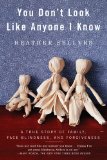Summary | Excerpt | Reading Guide | Reviews | Read-Alikes | Genres & Themes | Author Bio

Memories from a Decade Gone Mad
by Virginia HolmanA startling memoir of a daughter's harrowing sojourn in the prison of her mother's mind and a moving portrait of a young woman defined by her mother's illness -- until at last she rekindles a family love that had lost its way.
"1974 was a bad year to go crazy," Virginia Holman writes in this astonishing, beautiful, and painfully funny memoir of life with her schizophrenic mother in a disintegrating decade.
In May 1974, one year after Patty Hearst and her captors robbed Hibernia National Bank, a second kidnapping took place, far from the glare of the headlines. Virginia Holman's mother, in the thrall of her first psychotic episode, believed she'd been inducted into a secret army. On command of the voices in her head, she spirited her two daughters to the family cottage on the Virginia Peninsula, painted the windows black, and set up the house as a field hospital. They remained there for four years, waiting for a war that never came.
At first, it was easy to explain away her mother's symptoms in the context of the changing times -- her mother was viewed as "finding herself" in the spirit of the decade. When challenged about her delusion of the secret war, she invoked the name of Martha Mitchell. When she exhibited florid psychosis, her aunt, influenced by Hollywood's smash hit movie The Exorcist, seriously suggested that an exorcism might be in order. Even after she was hospitalized and diagnosed with schizophrenia in the early 1980s, Holman's mother retained just enough lucidity to appease caseworkers in a system seemingly more concerned with protecting a patient's rights than with halting the progress of a woman's desperately dangerous illness.
Rescuing Patty Hearst is an unflinching account of the dark days during which Holman's family was held hostage by her mother's delusions and the country was beset by the folly of the Watergate era. It is a startling memoir of a daughter's harrowing sojourn in the prison of her mother's mind. And, finally, it lingers as a moving portrait of a young woman defined by her mother's illness -- until at last she rekindles a family love that had lost its way.
 Augusten Burroughs, author of Running with Scissors
Devastating, gorgeous, triumphant, and beautifully, beautifully written. This book is a somersault out of a dark and terrifying childhood.
Augusten Burroughs, author of Running with Scissors
Devastating, gorgeous, triumphant, and beautifully, beautifully written. This book is a somersault out of a dark and terrifying childhood. Haven Kimmel, author of A Girl Named Zippy and The Solace of Leaving Early
Rescuing Patty Hearst is filled with potent images of family life, ghost children, refugees, secret armies. That it's a true story, and that Virginia Holman can write it now with such clarity and generosity, is astonishing.
Haven Kimmel, author of A Girl Named Zippy and The Solace of Leaving Early
Rescuing Patty Hearst is filled with potent images of family life, ghost children, refugees, secret armies. That it's a true story, and that Virginia Holman can write it now with such clarity and generosity, is astonishing. Jill McCorkle, author of Crash Diet and Final Vinyl Days
This brilliant, frightening memoir deserves a literary shelf all its own. That Virginia Holman survived growing up in the care of a schizophrenic mother with her feet firmly planted and her heart in the right place is miraculous. She skillfully depicts mental illness at its cruelest, without judgment or anger, and ultimately with a lot of acceptance, love, and an endearing sense of humor.
Jill McCorkle, author of Crash Diet and Final Vinyl Days
This brilliant, frightening memoir deserves a literary shelf all its own. That Virginia Holman survived growing up in the care of a schizophrenic mother with her feet firmly planted and her heart in the right place is miraculous. She skillfully depicts mental illness at its cruelest, without judgment or anger, and ultimately with a lot of acceptance, love, and an endearing sense of humor. Lee Smith, author of The Last Girls
Bravo to Virginia Holman for writing honestly and bravely of how illness can cripple an entire family. A testament to the power of love and the enduring human spirit, this brilliant memoir should be required reading for everybody.
Lee Smith, author of The Last Girls
Bravo to Virginia Holman for writing honestly and bravely of how illness can cripple an entire family. A testament to the power of love and the enduring human spirit, this brilliant memoir should be required reading for everybody.
If you liked Rescuing Patty Hearst, try these:

You Don't Look Like Anyone I Know
by Heather Sellers
Published 2011
An unusual and uncommonly moving family memoir, with a twist that give new meaning to hindsight, insight, and forgiveness.

by Sarah Hannah
Published 2007
Sarah Hannah follows her critically acclaimed first volume of poetry, Longing Distance, with Inflorescence, a compelling memoir-in-verse for her mother, Boston Expressionist painter Renee Rothbein, and their intense relationship in which they struggle with Rothbein’s mental illness and eventual death from cancer.